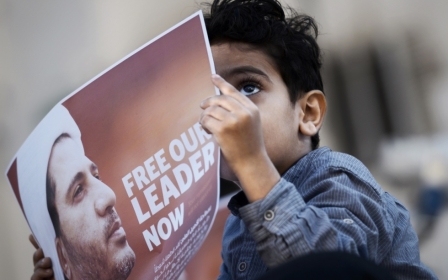Bahrain court sentences three to death over police killings

A Bahraini court sentenced three alleged Shiite militants to death on Thursday and jailed seven others for life after convicting them of killing three policemen in the Sunni-ruled Gulf state last year, prosecutors said.
The supreme criminal court also stripped eight of the defendants of their Bahraini citizenship over the 3 March bombing in a Shiite village, the deadliest attack since security forces crushed Shiite-led protests in March 2011.
Among the three policemen killed in Diah village was one officer from the United Arab Emirates.
First Lieutenant Tariq al-Shehi was the first foreign officer killed since Saudi-led troops and police deployed to the kingdom to support its crackdown on the Arab Spring-inspired protests.
The court heard that the defendants detonated the bomb after mobilising protesters to join a funeral in Daih village to lure in police.
Prosecutors said the defendants had planted three bombs in all but only one was detonated.
They charged that two of the defendants were among the founders of the little-known Al-Ashtar Brigades, a group that has reportedly claimed responsibility for several attacks in the Shiite-majority kingdom, including a July 2013 bombing outside a Sunni mosque.
Tiny but strategic Bahrain, which is home to the US Navy's Fifth Fleet, has been rocked by unrest since the crushing of the 2011 protests for parliamentary government and a constitutional monarchy.
At least 89 people have been killed in clashes with security forces, while hundreds have been arrested and put on trial, human rights groups say.
Bahrain's human rights record has come under the spotlight by several rights organisations which raised concerns over the country's criminal justice system.
In a 64-page 2014 report, Human Rights Watch concluded that the country's "criminal justice system fails to deliver basic accountability and impartial justice."
The UN Human Rights Council condemned Bahrain’s human rights record in a June 2014 statement, expressing “serious concern” at the human rights situation in Bahrain, with signatories criticising “increases in long [prison] sentences for exercising rights to freedom of peaceful assembly and of association”.
Despite the recent sentences however, Bahrain's use of corporal punishment remains relatively limited compared to other GCC countries, specifically Saudi Arabia, where the public use of capital and corporal punishment is common.
The Saudi kingdom carried out 15 beheadings in the first 20 days of 2015 and executed a total of 87 people in 2014, with 72 of these executions taking place between August and December.
Stay informed with MEE's newsletters
Sign up to get the latest alerts, insights and analysis, starting with Turkey Unpacked
Middle East Eye delivers independent and unrivalled coverage and analysis of the Middle East, North Africa and beyond. To learn more about republishing this content and the associated fees, please fill out this form. More about MEE can be found here.




